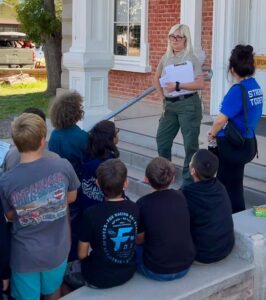“Addiction haunts the story of Peoples Temple,” according to Brittni Criglow. In an important respect, addiction is part of Brittni’s own story. Her return to sobriety beginning in 2019 led her into the study of Jonestown, first as a true crime afficionado and then into an identification with the people who lived and died in Jonestown.
 A museum specialist in the Southwest today, she admits that as a child “Little Brittni just wanted to be a museum person.” She grew up in Lincoln, Nebraska in a somewhat chaotic household with a strong father figure. After high school, she worked in the liquor industry for ten years before getting sober and just falling into the job “I wanted to do as a kid” – that is, being an interpretive guide at a state historical park.
A museum specialist in the Southwest today, she admits that as a child “Little Brittni just wanted to be a museum person.” She grew up in Lincoln, Nebraska in a somewhat chaotic household with a strong father figure. After high school, she worked in the liquor industry for ten years before getting sober and just falling into the job “I wanted to do as a kid” – that is, being an interpretive guide at a state historical park.
Her introduction to Jonestown was through Jeff Guinn’s book The Road to Jonestown, which a friend gave her. The next book was Deborah Layton’s Seductive Poison. She also tuned into the podcast Promised Land, which she found “strangely comforting and familiar,” given her childhood. But the focus soon shifted from Jonestown to Peoples Temple, especially with Laura Johnston Kohl’s memoir Jonestown Survivor. In it, Kohl describes deprogramming as similar to persuading an addict to quit: it has to be a personal choice. “That was the first time I equated addiction with group membership,” Brittni recalls.
A pivotal moment in her life occurred during the Covid lockdown and the protests that roiled the country after the murder of George Floyd by police officers in 2020. Living in Portland, Oregon at the time, Brittni reports that the protests awoke in her “a sense of obligation to my fellow humanity,” a feeling that part of her sobriety was bound up in helping the community.
The turning point in her thinking about Peoples Temple, however, came with the reading of Ethan Feinsod’s Awake in a Nightmare, which presents Odell Rhodes’ experiences in the Temple. Rhodes’ trip from addiction to caring for children corresponded to her own work in a junior museum program and community outreach. “I felt very connected to Odell Rhodes and his story and his addiction,” she says, “and in the end, his finding such purpose working with children.” Brittni adds, however, that Peoples Temple was “simultaneously helping people recover from drug addiction and recruiting them at the same time.”
Her deep reading into Temple history caused her to identify a significant theme: drug abuse. She began “obsessively searching for stories of addiction and addiction recovery.” This served as the background for her article “You Don’t Tell God He’s Got a Drug Problem”: Addiction’s Role in People’s Temple. In it, she describes the drug problems not only of Jim Jones and Odell Rhodes, but also of other Temple members. “Once I began to notice the pattern, I saw it everywhere.”
This led her to the massive undertaking of transcribing the handwritten notes from Jonestown’s dispensary to analyze the number and kinds of drugs available to the community. “Not only is it a vast amount of medication to be managing and prescribing, but it says a lot about the knowledge of the medical staff.” She adds, “It takes my breath away to think about it.”
In addition to having a medical clinic, the community had a chemistry lab in which to test soil samples and conduct other analyses to assist in agricultural production. And, of course, the lab had the means to order cyanide legally, as Brittni explains in her article The Definitive Guide to Cyanide in Jonestown. In it she carefully tracks the arrival of cyanide in the community, along with its devastating effects on the last day.
 She became a website volunteer as a result of her research, since she relied on it to gather stories of addiction. “Little by little you start to realize that this is a massive undertaking with so many people doing this and making it possible.” When she found there were no transcriptions of documents she needed to use, she decided to transcribe them for herself before realizing that this was a perfect opportunity to return the favor.
She became a website volunteer as a result of her research, since she relied on it to gather stories of addiction. “Little by little you start to realize that this is a massive undertaking with so many people doing this and making it possible.” When she found there were no transcriptions of documents she needed to use, she decided to transcribe them for herself before realizing that this was a perfect opportunity to return the favor.
In an odd way, she reflects, she feels connected to the idea of the Peoples Temple community, even though she’s not part of it. “Researching Peoples Temple has been a core part of my sobriety. It’s a core part of my life. I’m giving back to everyone else that has worked before me in research. I now get to give as well.”
A complete listing of Brittni Criglow’s contributions to the digital archive appear on her profile.
(Rebecca Moore is Professor Emerita of Religious Studies at San Diego State University, and has written and published extensively on Peoples Temple and Jonestown. Rebecca is also the co-manager of this website. Her full collection of articles on this site may be found here. She may be reached at remoore@sdsu.edu.)